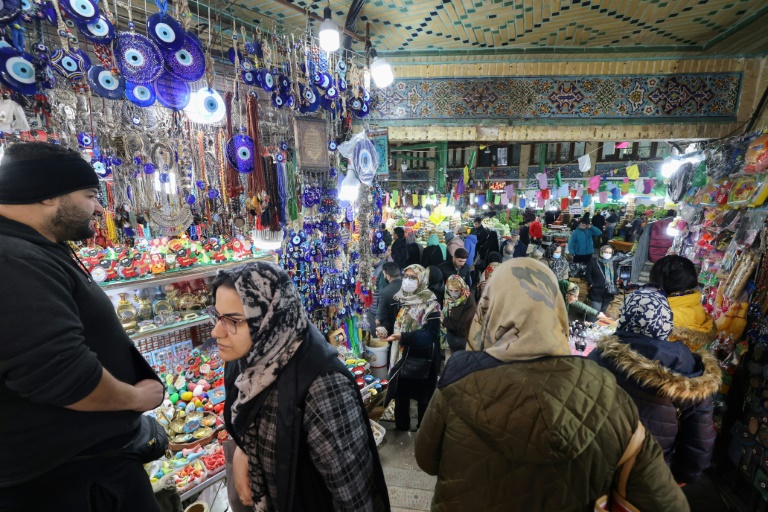Iranians tighten belts for Persian New Year festivities

Shoppers throng a Tehran market as they prepare to mark the Nowruz Persian New Year amid economic woes in Iran
Tehran – Millions of Iranians will travel to be with their families for Nowruz, the Persian New Year, on Wednesday but economic troubles in the sanctions-hit country are weighing on the festivities.
Iranians will celebrate the start of the year 1403 at exactly 26 seconds past 6:36am (0406 GMT) on March 20, matching the astronomical time of the spring equinox.
Globally, some 300 million people will wish each other “Happy New Year” (“Nowruz mobarak”) including in Iran, Afghanistan, Kazakhstan and among Kurds in Turkey, Iraq, Syria and elsewhere.
“It’s the most important holiday of the year, the one where we forget our problems to get together with our loved ones and dream of a better year,” said Marjan, a young woman from Tehran who, like the other people AFP spoke to, declined to give her full name.
Celebrated for 3,000 years, Nowruz marks a two-week break when Iranians travel within the country or, for the more fortunate, abroad. Yet many have plans for diminished feasts this year.
“Food products are far too expensive because of inflation,” Afshar, a 44-year-old accountant, told AFP at the Tajrish bazaar in northern Tehran.
Annual inflation officially stands at 44 percent, according to local media, after hitting 46 percent last year.
“I bought meat at 700,000 toman (around $12) per kilo, but I only earn 9.8 million ($160) per month after a 30-year career,” said a 68-year-old resident of Tehran who did not wish to be named.
In a bid to simplify transactions, Iranians have long referred to their currency as the toman and chopped off a zero.
– ‘Situation is deplorable’ –
“The situation is deplorable,” said Ghassemi, a 28-year-old real estate agent, calling on the government “to mobilise to improve the situation and better manage the country”.
Last Nowruz, Iran’s supreme leader Ali Khamenei acknowledged that Iranians felt “bitterness” due to “high prices, particularly of food and basic necessities”.
He then tasked the government with measures to implement “inflation control”.
Authorities in Iran have blamed Western economic sanctions for the surge in prices.
The sanctions were reimposed by the United States in 2018 after Washington unilaterally withdrew from a 2015 agreement that eased sanctions in return for curbs on Tehran’s nuclear programme.
Since then, the Islamic republic has suffered from the continued devaluations of its currency and a surge in prices.
Despite the headwinds, Iran recorded stronger growth than expected in 2023.
The International Monetary Fund estimated that growth reached 5.4 percent last year and increased its 2024 forecast from 2.5 percent to 3.7 percent.
Iranian President Ebrahim Raisi recently denounced “the enemy’s strategy” which he said aimed “to create despair within society”.
He was speaking two weeks after the March 1 legislative elections, which had a turnout of just 41 percent, the lowest since the 1979 Islamic Revolution.
– New year during Ramadan –
“Dissatisfaction” is high with the “economic, employment, poverty or inequality” situation, Hassan Khomeini, the grandson of the late Ayatollah Ruhollah Khomeini who founded the Islamic republic, told reformist newspaper Etemad on Saturday.
Many experts in Iran have attributed the low voter turnout to popular dissatisfaction, in particular over economic issues.
For the second year in a row, Nowruz festivities coincide with the Muslim fasting month of Ramadan, which began on March 11 in Iran.
Eating, drinking and smoking in public are banned in the Islamic republic during Ramadan, when the faithful fast from dawn to dusk.
In recent years, however, the authorities have somewhat relaxed the strict rules during Ramadan.
Certain cafes and restaurants, in specified areas, such as in the vicinity of hospitals, are allowed to open during the day.
The restaurants however must observe strict conditions, including covering their windows so that the interior is not visible to fasting passers-by.
